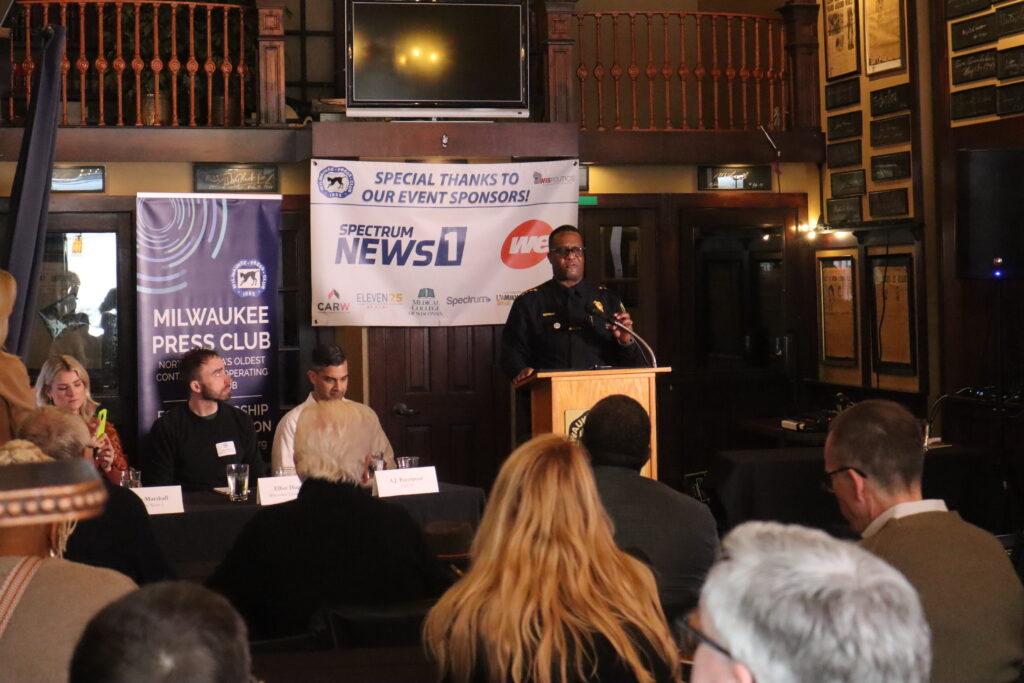Police Chief Jeffrey Norman Talks Crime, Guns and RNC
Milwaukee's top cop appeared before the Milwaukee Press Club Thursday.

Milwaukee Police Chief Jeffrey Norman appears at the Milwaukee Press Club luncheon. (Photo | Isiah Holmes)
“As in freedom is not free, public safety is not free,” Milwaukee Police Chief Jeffrey Norman told reporters gathered at the Newsroom Pub in Milwaukee Thursday afternoon. Norman was headlining a Milwaukee Press Club luncheon, preparing to be peppered with questions about crime and public safety. The police chief, who has headed the Milwaukee Police Department (MPD) since 2021, started off by invoking a national day of remembrance for fallen police officers, emphasizing the importance of public support on the morale of officers.
Early last year, MPD officer Peter Jerving was shot and killed while attempting to apprehend a robbery suspect. Jerving was the fifth MPD officer to lose his life on duty since 2018. “Not only should we acknowledge and remember those who have fallen,” Norman said, “but thank a law enforcement officer in regards to the work they do.”
Dropping crime rate
“Crime is down,” Norman declared. While he didn’t quibble with specific concerns within the community, he stressed that from 2021-2022, the city saw crime reductions as high as 15%, including a 6% drop in violent crime. Those trends continued into 2022 and 2023, although Norman admitted, “We’re not where we need to be at.” Although the numbers have not fallen to pre-pandemic rates, Norman said many aspects of society have not returned to their pre- pandemic state. “What industry out there is pre-pandemic?” asked Norman. “Don’t put that all on your law enforcement that we are responsible to be in a place where we all have responsibility to work towards, to do the work that needs to be done within our community.”
Community safety is a team effort, Norman stressed, adding that local elected officials including Mayor Cavalier Johnson have been good partners with the MPD. “I’m a proud Milwaukee resident, lived here all my life, I ain’t going anywhere,” said Norman. “This community is my community, too.”
Norman pushed back against the perception that youth are responsible for crime in Milwaukee. “When we talk about youth crime there is, yes, an uptick, but we as adults are doing more … than we want to acknowledge, or admit,” said Norman. “And I don’t want that narrative to take over, in regards to thinking our young ones in the community are the only ones messing up.” When it comes to reckless driving, an issue which is often framed as a problem fueled by young people, Norman said MPD statistics show most of the speeders and reckless drivers are between the ages of 20-31 years old.
“The data drives how we need to engage,” said Norman, who also stressed the importance of community engagement, saying, “I’m telling you what we’re doing, what can you do?”
For gun crime, Norman blamed negligent firearms owners, straw purchasers and their suppliers, ghost guns and politics. To legislators he said, “We’re telling you the problems, [it’s now] up to you to come up with those solutions.”
The solutions Norman endorsed in his talk were small-scale, including getting employers to train employees visiting Milwaukee on business to secure their firearms.
ShotSpotter debate
Norman also addressed MPD’s use of ShotSpotter, an audio surveillance system used to detect and locate gunshots. Recently, the city of Chicago opted not to renew its contract with ShotSpotter’s parent company, SoundThinking. The news comes as a major leak revealed the locations of ShotSpotter sensors across the country, including in Milwaukee. ShotSpotter has operated in Milwaukee since 2010. While police say ShotSpotter helps streamline emergency responses, critics question the technology’s effectiveness and impact on privacy.
Norman said that the MPD has worked not to rely solely on ShotSpotter. The technology is an “objective” tool, Norman said. “ There’s no type of ethnicity or race behind that, that’s an objective act,” he added, responding to criticism that ShotSpotter is concentrated in Black and Latino neighborhoods, and has been connected to mistaken arrests of people who live in those neighborhoods. Norman highlighted Operation: Summer Guardian, which for the past couple of years has utilized ShotSpotter in focused gun crime operations. “We’re not coming in to be an occupying force,” Norman added.
Bringing cops back into schools
As part of the shared revenue deal reached by legislative leaders, Gov. Tony Evers and local officials, the city of Milwaukee is required to rehire at least 25 school resource officers in its public schools. The school board, after pressure from students, voted to expel resource officers. Students have expressed that resource officers do not make them feel safer, and often escalate conflicts in the schools. Norman said that rehiring resource officers is within the school board’s domain, as is shaping a new program for their use within public schools. Earlier this year, the school district said it was scouting out various resource officer programs nationwide for best practices.
Getting ready for the RNC
As Milwaukee gears up to host the Republican National Convention this summer, Norman pushed back against concerns that police will be distracted and unable to meet the needs of the community outside the convention bubble. During large sporting events service isn’t affected, he said. To prepare for the convention, MPD is also working on contacting other police departments to volunteer personnel to help staff the convention. However, Norman said, he doesn’t want personnel who will cause problems or who fail to abide by the department’s values. “I will send you home,” warned the chief.
Technology and policing
Norman said the department is continuing to strategize how to deal with issues like reckless driving. MPD officers are terminating chases when they reach unsafe high speeds. The department is exploring alternative technologies and Norman has also advocated for re-engineering streets to slow traffic.
Wisconsin Examiner asked Norman about the MPD’s use of predictive policing, which involves the use of algorithms to essentially forcast crime. While supporters of predictive policing say it facilitates more accurate and objective enforcement, critics point to a lack of transparency around use of predictive policing strategies and technology, and potential problems with the algorithms themselves.
Documents released by the Wisconsin Homeland Security Council through open records show that MPD has its own Predictive Intelligence Center. This unit, which is part of the Southeastern Threat Analysis Center – one of the state’s intelligence fusion centers – is described in documents as being responsible for “crime analysis for Milwaukee by identifying emerging trends and patterns.” The Predictive Intelligence Center also “provides managers with operational level analysis to support more efficient and effective deployment of resources,” according to the records. Work done within the Predictive Intelligence Center “provides opportunities for offender identification, enhances investigative leads, and can connect offenders to networks of co-conspirators.”
Norman admitted that he didn’t fully grasp the use of MPD’s predictive intelligence strategies. The chief did state that artificial intelligence (AI) is a constant topic of discussion within law enforcement. “Technology is a game changer as we deal with challenges for the human resource,” said Norman, referencing staffing shortages. Norman said great care and attention must be afforded when using new technologies like AI.
Police also worry about AI technology being used against departments, he added, and he continues to learn about AI and other technological threats and assets.
Drug overdoses and harm reduction
The chief also answered a question from Wisconsin Examiner about police responses to drug overdoses. A bill introduced last year in the Wisconsin Legislature aimed to increase penalties related to overdose deaths. The bill does not carve out protections for co-users who call 911 when a loved one overdoses. Even if they are not drug dealers or distributors, they could be prosecuted under the proposed law.
Norman said that when police respond to overdoses, the first priority is to save lives. Even so, officers may still need to question people involved, even if it’s simply for medical purposes. Norman also pointed to the deployment of free-to-use vending machines stocked with fentanyl testing strips, overdose-reversal medication like Narcan, and other supplies as gestures of good faith from law enforcement to the community. “We’re expanding that,” said Norman.
“We want people to get help, we want people to be able to save lives. And I would hope that it would show that we are really genuine about that.” MPD’s most important, yet often it’s scarcest resource, he said, is trust.
Milwaukee police chief on crime, guns, new technology and the RNC was originally published by Wisconsin Examiner.


















